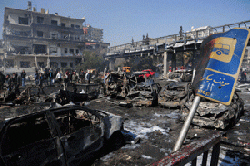DAMASCUS – A powerful car bomb exploded Thursday close to ruling party offices in Damascus, killing over 50 people and causing widespread destruction in the Syrian capital’s deadliest attack for more than nine months.
The bombing, which rocked the city center and sent thick smoke scudding across the skyline, was followed soon after by a mortar attack on a nearby military headquarters.
The attacks came as the opposition umbrella group, the National Coalition, was meeting in Cairo to discuss proposals to hold conditional talks with President Bashar al-Assad’s regime.
Images of charred bodies lying next to mangled vehicles were broadcast by Al-Ekhbariya state television, which said children were among those wounded as the blast occurred near a school in the central district of Mazraa.
Sirens rang out, and machine gun fire was also heard, as firemen rushed to the scene to douse the flames.
A police official said the car bomb exploded at the 16 November Square near the Al-Iman mosque, where the ruling Baath party’s head offices are located.
State television said the blast, which left a large crater in a road, killed 53 people and wounded dozens, making it the bloodiest in the capital since twin suicide bombings left 55 people dead on May 10, 2012.
The Syrian Observatory for Human Rights put the toll at 42 dead, including nine troops, and dozens wounded.

|
| Vehicles burn near a crater on a road after an explosion at central Damascus February 21, 2013, in this handout photograph released by Syria’s national news agency SANA. |
There was no immediate claim of responsibility, but the official SANA news agency blamed the attack on “terrorists” — the regime’s term for rebels who have been fighting to oust Assad for nearly two years.
“It is terrorism… Is that what you call Islam?” one of the wounded told Syrian television.
“Is that the freedom you want? Is that the (rebel) Free Syrian Army?” said another man, speaking at the site of the attack.
The opposition denounced as “terrorists” those behind the bombing.
“Any acts targeting civilians with murder or human rights violations are criminal acts that must be condemned, regardless of the perpetrator or the justification,” the National Coalition said on Facebook.
The bombing was followed by a mortar attack on a military headquarters, Al-Ekhbariya and the Observatory both reported, without giving information on casualties.
The Observatory — which relies on a network of sources for its information — also said two other car bombs exploded next to security posts in the north Damascus district of Barzeh.
The attacks come two days after two mortar shells exploded near the Tishreen presidential palace in the capital, increasingly targeted in the past year by suicide bombings, some claimed by the jihadist Al-Nusra Front.
They added urgency to the National Coalition meeting in Cairo, where discussions were centered on an offer by the opposition group’s chief to hold direct talks with the regime.
“The agenda is long and among the issues to be discussed is the initiative of Ahmed Moaz al-Khatib,” delegate Khaled Nasser said.
Coalition chief Khatib has offered to talk to regime officials without “blood on their hands” — naming Vice President Faruq al-Sharaa as a possible pointman. The regime says it will only negotiate without pre-conditions.
Khatib’s initiative has been welcomed by the Arab League and the United States as well as Assad allies Iran and Russia, but the Syrian National Council, a key part of the Coalition, has rejected any talks until Assad quits.
UN-Arab League peace envoy Lakhdar Brahimi, who on Wednesday extended his mission by six months, has urged support for the plan, saying talks would “be a start to exiting the dark tunnel.”
Elsewhere, Russia said Foreign Minister Sergei Lavrov would hold his first meeting with new U.S. Secretary of State John Kerry on Tuesday in Berlin, with the Syria conflict likely to top their agenda.
-Reuters, TAAN






Leave a Reply